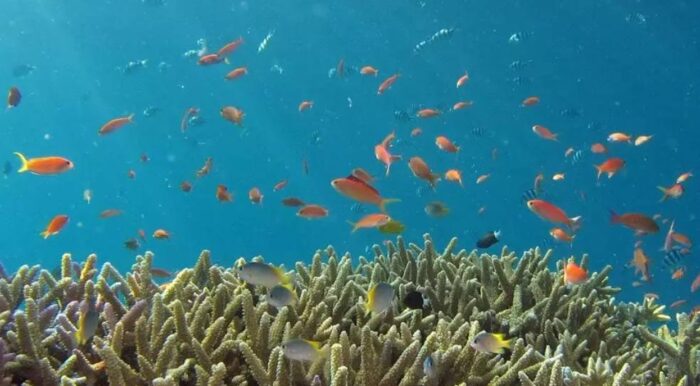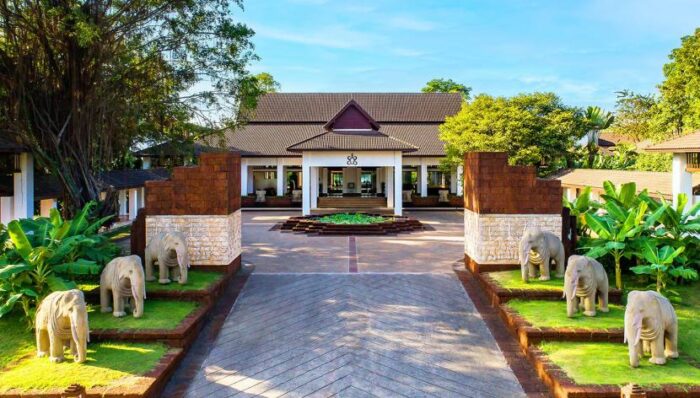 Phu Quoc, Vietnam, July 5, 2023 / TRAVELINDEX / Family adventures are among our most cherished moments. For parents, they offer precious opportunities to get away from the world and spend quality time with loved ones in paradise, while for kids, they set the stage for exciting explorations, making new friends and even discovering a lifelong passion. With breath-taking pool villas, bespoke services, immersive activities and dramatic dining destinations, Regent Phu Quoc lets parents and children come together and share unparalleled experiences.
Phu Quoc, Vietnam, July 5, 2023 / TRAVELINDEX / Family adventures are among our most cherished moments. For parents, they offer precious opportunities to get away from the world and spend quality time with loved ones in paradise, while for kids, they set the stage for exciting explorations, making new friends and even discovering a lifelong passion. With breath-taking pool villas, bespoke services, immersive activities and dramatic dining destinations, Regent Phu Quoc lets parents and children come together and share unparalleled experiences.
Simply stepping through the doors of Regent Phu Quoc, IHG Hotels & Resorts’ jewel on Vietnam’s “Pearl Island,” provides an escape from the everyday. From private pool villas to creative cuisine, immersive activities and so much more, this resort will transport discerning families on a journey into a tropical world of wonder.
Luxurious family sanctuaries
The artfully-designed pool villas at Regent Phu Quoc are personal havens where families can stay together in complete comfort and privacy. With between one and seven bedrooms, open-plan indoor and outdoor living spaces, glistening 25 – to 123-sqm private pools and breath-taking views on the Gulf of Thailand or the tropical gardens, these hideaways provide everything guests need to feel relaxed, revitalised, and re-energised. Private dining areas provide opportunities to share unexpected tastes overlooking the ocean, and state-of-the-art entertainment systems enable cosy moments of warmth – cuddling up with loved ones to watch a movie.
Inspiring children’s activities
Curated activities empower all families to stay and play on their own terms. On top of their private amenities, the resort’s oasis features five pools, including a kids’ pool, and provides endless opportunities to swim and splash. On the Long Beach, young guests will love the regular treasure hunts, sandcastle competitions, water gun fun and more. Parents can also leave their little ones in the expert care of the professionally-trained team at the kids’ club, who will create entertaining and educational activities, inspired by the nature, culture and spirit of Phu Quoc. To learn more about the activities for children at Regent Phu Quoc, simply click here.
The resort’s kids’ club is a haven of fun with plenty of entertaining and inspiring activities for children
Immersive aquatic adventures
The sea sets the stage for exhilarating adventures. All ages can feel the spray of the ocean with windsurfing, kayaking, stand-up paddle-boarding and dinghy sailing, and the underwater world comes alive with snorkelling trips. For truly unforgettable family escapes, Serenity, Regent Phu Quoc’s luxury yacht, offers coastline cruises to secluded bays, where guests can swim and snorkel in the sea – the ultimate experience for older children seeking a fresh view of the world. Private charters are also available.
Exotic island explorations
Intrepid explorers can also head out and uncover the hidden treasures of Phu Quoc, an exotic wilderness comprising 99 peaks, 28 islands and 20 beaches, as well as charming fishing villages that provide a unique glimpse into the culture of life in Vietnam’s “Pearl Island.” After a long day of discovery, the resort’s Health Club offers holistic wellness therapies for parents and children alike, including deeply soothing aloe vera massages – wonderfully revitalizing after a day of fun in the sun.
Creative culinary journeys
Families can embark on exciting epicurean journeys together at Regent Phu Quoc. A haven of gastronomy, this five-star resort offers a collection of artfully curated culinary venues including Oku, the signature restaurant that serves contemporary Japanese-French cuisine, and Rice Market, an atmospheric marketplace that elevates the humblest Asian ingredients – rice and noodles – to new levels of excellence. Bar Jade is a hidden speakeasy cocktail bar with a cosmopolitan vibe, and the Lobby Lounge sets the scene for relaxing daytime drinks and evening refreshments. For the ultimate sunset moments, Ocean Club is nestled on the shore and specialises in Mediterranean plates and spectacular seafood platters, and Fu Bar is perched elegantly on the rooftop, with sweeping views of the island and sea through panoramic windows.
A selection of fresh menu items have been crafted especially for families, such as Rice Market’s Blue Crab Fried Rice, which uses the best Vietnamese rice, ST25, and will transport diners’ taste buds to a traditional fishing village, and a sensational Vietnamese Wagyu Beef Salad. At Ocean Club, the Barbecued Seafood Tower showcases the world’s finest fruits de mer including whole Phu Quoc lobster, Irish oysters, Japanese scallops and much more, served with a selection of sauces, and the Australian Wagyu Beef Tomahawk, a decadent 1.3kg prime cut of beef with Vietnamese seasonings.
“At Regent Phu Quoc, we understand that every family is unique. That’s why we promise a curated collection of breath-taking pool villas, bespoke services and immersive activities for children of all ages, from tots to teens – and of course, their parents – so every family can share the most private and inspiring experiences on the island,” said Sriram Kailasam, Regent Phu Quoc’s General Manager.
Under the “Stay and Dine” package, families can now book an unforgettable escape at Regent Phu Quoc, including daily buffet breakfast plus three-course lunches and dinners at the Ocean Club or Rice Market. With every paying adult, a child under 12 can dine for free for all bookings made between now and 30th September 2023. For reservations, please visit https://phuquoc.regenthotels.com/offers/stay-and-dine










